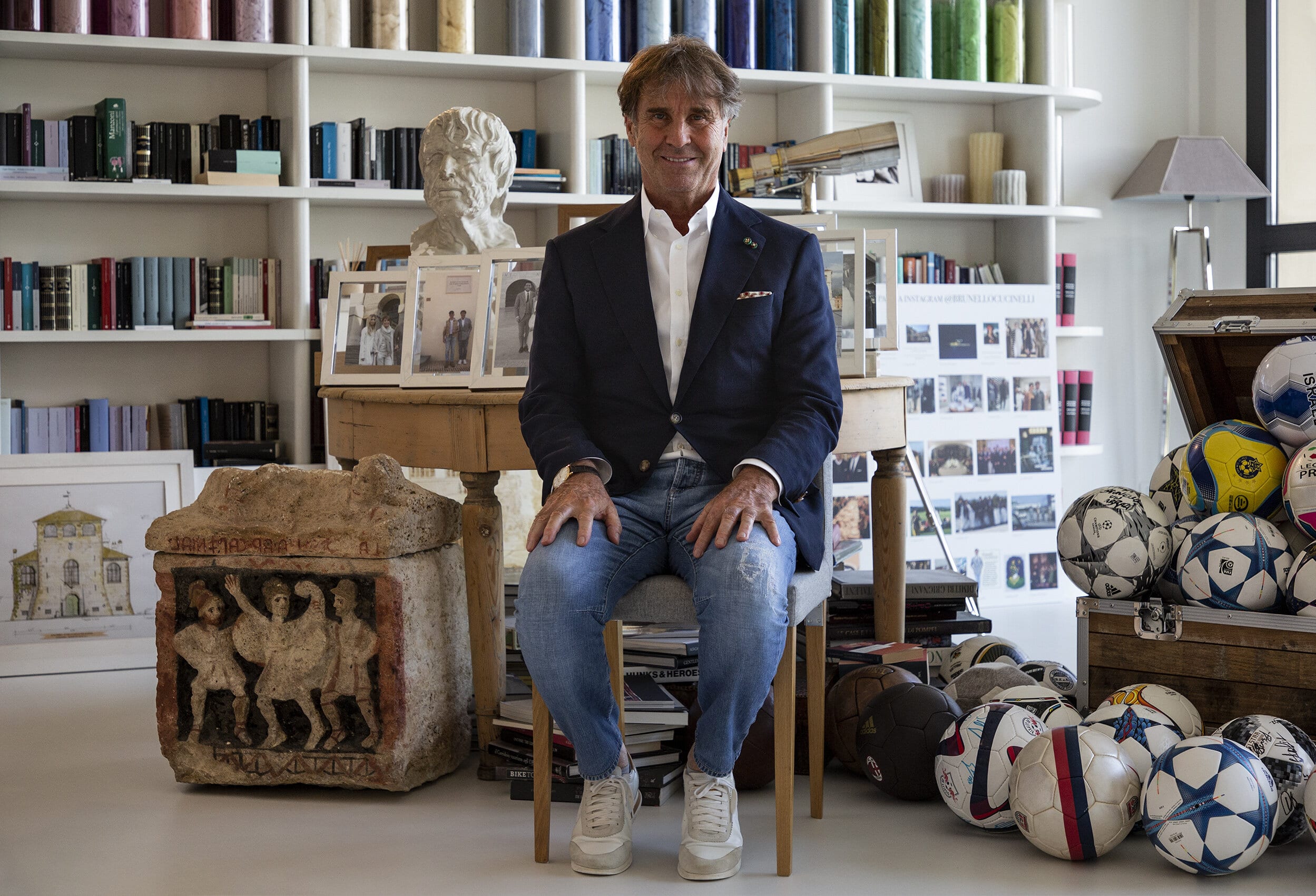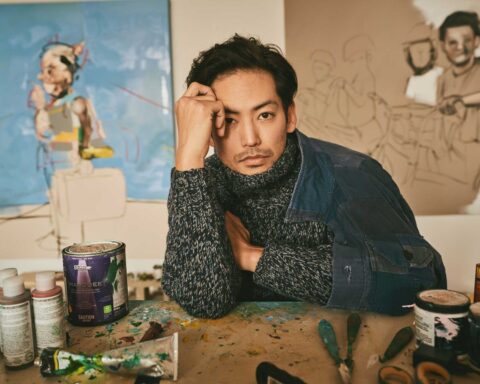“I believe in a humanistic enterprise: business should comply in the noblest manner with all the rules of ethics that man has devised over the centuries. I dream about a form of humanistic modern capitalism with strong ancient roots, where profit is made without harm or offence to anyone, and part of it is set aside for any initiative that can really improve the condition of human life: services, schools, places of worship and cultural heritage.” -Brunello Cucinelli
The life of Italian fashion designer Brunello Cucinelli resonates with the subtle magnificence of a timeless parable.
Born in 1953 to a peasant family in the Italian region of Umbria, whilst his childhood was serene, his home was modest at most, without electricity until he was 15 years old. Having originally obtained a diploma as a building surveyor, he enrolled, then dropped out, of the Faculty of Engineering at Perugia University. But in 1978 his life was to change, as he set up a small cashmere company that caught the eye of the market with his idea of dying the wool in bold and brilliant colors.
Growing up, an avid student of human behavior, Mr Cucinelli bore witness to the poor treatment his father endured at work after they moved to the city. It was a lesson that was to inform his entire philosophy for the future, whereby he became committed to treating people with dignity and respect, with a focus on purpose and quality of life. His vision and hard work took him from his very humble beginnings to creating one of the great fashion houses of our times. That accomplishment in itself is a riveting success, but what distinguishes him from others has been his philanthropic desire to raise the life experience of all who work for and with him, and his community.
In 1982, he began to purchase the decaying and virtually abandoned 14th century hamlet of Solomeo, the place his wife Federica grew up in, and 15 miles away from Mr Cucinelli’s own birthplace of Castel Rigone. He set about restoring it, adding to its original splendor, whilst also developing and using it as the epicenter for his business. Alongside the development of his factories, he also repaired roads, planted vineyards, erected a 16th century style theatre, founded a tuition-free arts school, and much more, all creating numerous employment opportunities for the locals. He led the way as a cultural custodian, with the intention of setting the town up for hundreds of years to come.
Mr Cucinelli affords his 1000 workers a 90 minute lunch break at the factory cafeteria, with locally sourced food and wine. He closes shop daily at 5.30pm and expects no-one to email about work thereafter. He pays all who work for him 20% above the market average. The company donates around 20% of profits to further the cultural life of the town through the Brunello Cucinelli Foundation. And during the pandemic, he has gifted garments that remained in stores due to their temporary closures, with a production value $36.5 million, to people around the world in need of their spirits lifting.
Mr Cucinelli is a bonafide bibliophile, a renaissance man, a philosopher who’s dedicated his life to learning, reaching back over the centuries to learn from the much lauded words of the greats in classical and enlightenment philosophy.
We at Mr Feelgood are very much inspired by how Mr Cucinelli walks the walk with his perpetual enthusiasm, his giving back, his love and awe for nature, humanity and for the limitless potential of mankind. And we are honored he is subject of our last ‘Who The F*** Are You?’ profile of 2020.

View of Solomeo, Italy
Who the f*** are you?
Along with every other individual human being, I live as a small spark in the universe. On a few very rare occasions in history, one of these sparks has been able to bestow great gifts on mankind: I am thinking of Michelangelo, I am thinking of Einstein. Another great man, Dante Alighieri, used to say, “From a little spark may burst a flame.”
How are you feeling right now?
My clearest feeling is that, after a time that was not easy for humanity as a whole, a New Time of renewed serenity and trust in human relations is opening up before us. Then I also have another very good feeling, namely that every human being has had the opportunity for a rebirth of spirit during the health emergency. By that, I mean the precious opportunity to reflect deeply on the importance of the great themes in life, which for me are human sustainability, the balance between profit and giving back, human dignity, and universal humanism.

L to R: A young Brunello, second from left, in Castel Rigone; with wife Federica in 1973; at 16 years old studying as a building surveyor
Where did you grow up and what was it like?
I have entrusted my best memories to a book entitled ‘Il Sogno di Solomeo’ (The Dream of Solomeo). I was born in the country, to a family of sharecroppers, then I spent my youth at the local cafè, which I now consider my University of the Soul. I view these periods of my life as personally epic; in my eyes they are the greatest gifts, because the first taught me the steady values of timeless ideals and those of tradition, the second taught me to look at the future as a boundless horizon of possibilities.
What excites you?
The fascinating mystery of nature. Moreover, I still feel one of the greatest emotions every time I raise my eyes to the sky, as Florensky [the Russian philosopher] suggested to his children every time they felt their souls were heavy. But I must say that I also get very emotional when my grandchildren are asleep and I talk to them. My wife says to me, “What are you doing? They are sleeping” and I think, ‘Who knows, maybe they are listening.’ And in any case it does my soul good to speak to them as the next guardians of humanity.
What scares you?
Honestly, I don’t have any fears that overwhelm me: in this I take a lot of inspiration from my beloved Seneca [a Stoic philosopher] who, in ‘De Tranquillitate Animi’, points out that man should not fear adversity if he behaves correctly and according to virtue.

Looks from the Brunello Cucinelli Spring/Summer 2021 collection
What’s your proudest achievement?
One of my greatest satisfactions was when my esteemed German friends awarded me the prestigious title of ‘Honourable Merchant’. That was and still is a great source of pride for me.
What is the hardest thing you have ever done?
It was probably having to accept the passing of some loved ones, such as the extraordinary figure of Don Alberto Seri, a parish priest in our village of Solomeo, who has remained in the hearts of the entire community and who in his life interpreted the teachings of Don Giovanni Bosco [the Italian Roman Catholic priest] at his best.
Who was your greatest mentor and what did they teach you?
Father Cassian, a Benedictine monk from the monastery in Norcia; from him I learnt the rule of an industrious and prudent life, the courage to always try the real things, the strength to know how to be both a man for myself and a man for others.

The Brunello Cucinelli headquarters in Solomeo
Who are your fictional and real-life heroes?
Socrates, for philosophy, Confucius, for spiritual and political thought, Hadrian the Emperor, for stoic action towards the world.
What is your favorite item of clothing in your wardrobe?
I normally keep all the clothes I have worn in my life. Each garment reminds me of a specific moment in life. I am particularly keen on reusing, repairing and recovering. This also applies to clothing. I like the idea of using and not consuming. If I really had to choose a garment, I would go for cashmere and cotton panama corduroy trousers, paired with a one-and-a-half-breasted cashmere navy blazer.
What music did you love aged 13 – and do you still love it now?
I was born in 1953, we were a large family and lived in the country with no electricity, and the only thing we could listen to was music on a battery operated radio. There is no doubt that the Beatles were fascinating for my youth and they still are, I am moved by their music.

Looks from the Brunello Cucinelli Spring/Summer 2021 collection
What is the most inspiring book you have ever read?
Hadrian the Emperor once said, “Books have shown me the way in life, whoever builds a library will have built a granary for future generations.” I can’t pick just one single book, but the top two would be Marcus Aurelius ‘Thoughts’ and Plato’s ‘Symposium’.
What is a movie that left a lasting impression on you?
I have always been fascinated by movies, perhaps the one that resembles me the most, because that’s how I lived as a boy, is ‘Nuovo Cinema Paradiso’ by Giuseppe Tornatore, an Academy Award winner in 1990.
What is your favorite word or saying?
Here, I would really like to quote many, one of the most inspiring being that of Hadrian the Emperor, “I feel responsible for the beauty of the world.” Please let me list another one, “Live according to nature, give yourself peace, indulge humanity” by Marcus Aurelius, emperor and philosopher.
What would you like people to say at your funeral?
My father is still alive and is 99 years old, and he has always told me, “Be a good man.” I won’t hide from you that on that day I would like someone to say, “He was a good man, he loved beauty.”

The town of Solomeo
And finally, a quickfire five favorites…
Car?
My super-favourite is my Bentley Continental GT.
Sports team?
Ever since I was a kid I’ve had a liking for Juventus and Inter. I realise it’s impossible to say this, but what matters the most to me is the grace with which the coach manages the team.
Meal?
Here I have no doubt: rigatoni with tomato sauce and basil.
Grooming product?
I always tend to use the same ones but maybe that’s normal. I’ve been using the Azzaro fragrance since I was a kid, and La Prairie moisturiser for many years now.
Clothing brand?
As you might well understand, I wear Brunello Cucinelli.

Brunello Cucinelli wearing Brunello Cucinelli
All pictures courtesy of Brunello Cucinelli. Watch Brunello read his ‘Letter For A New Social Contract With Creation’ from his theatre here.









